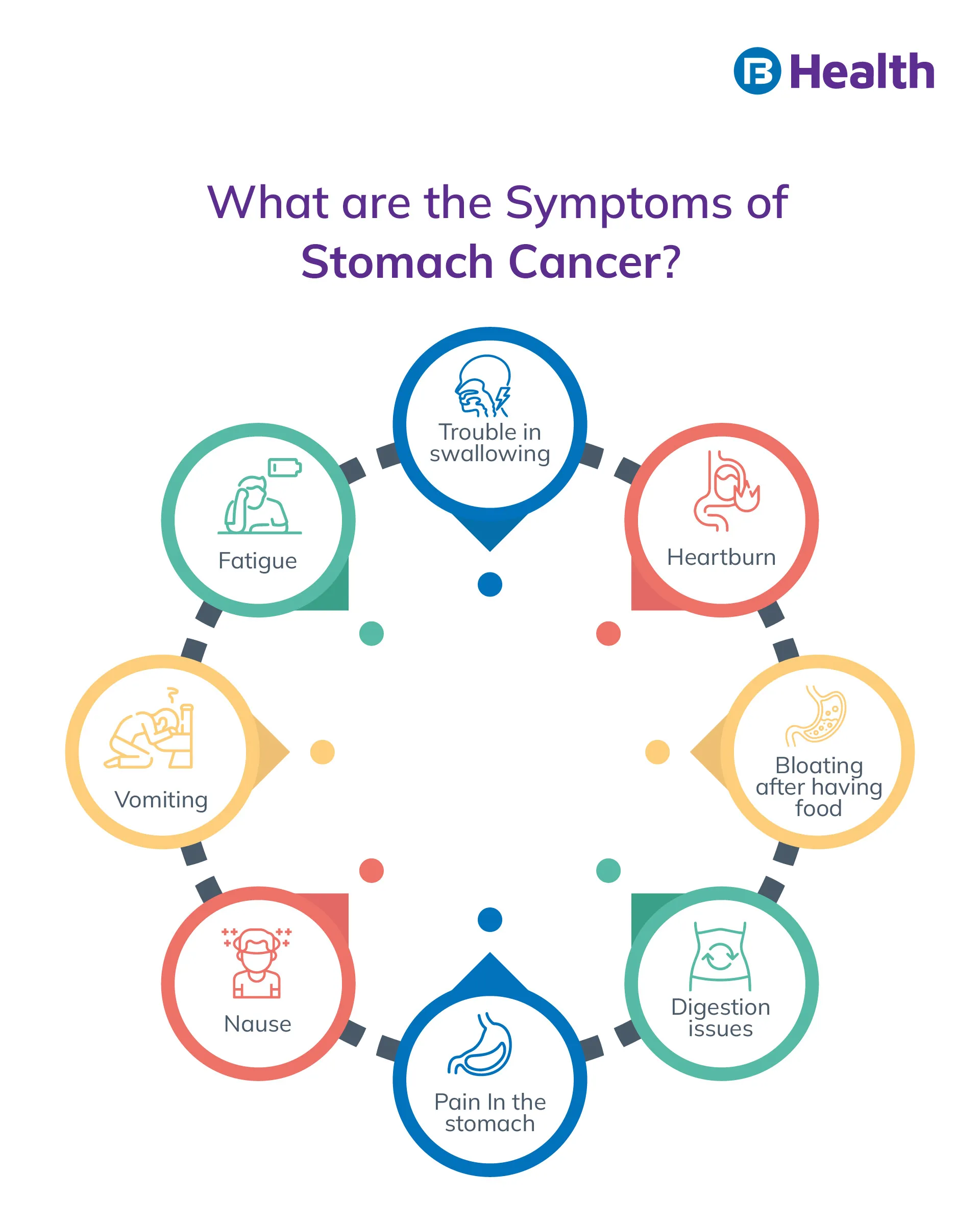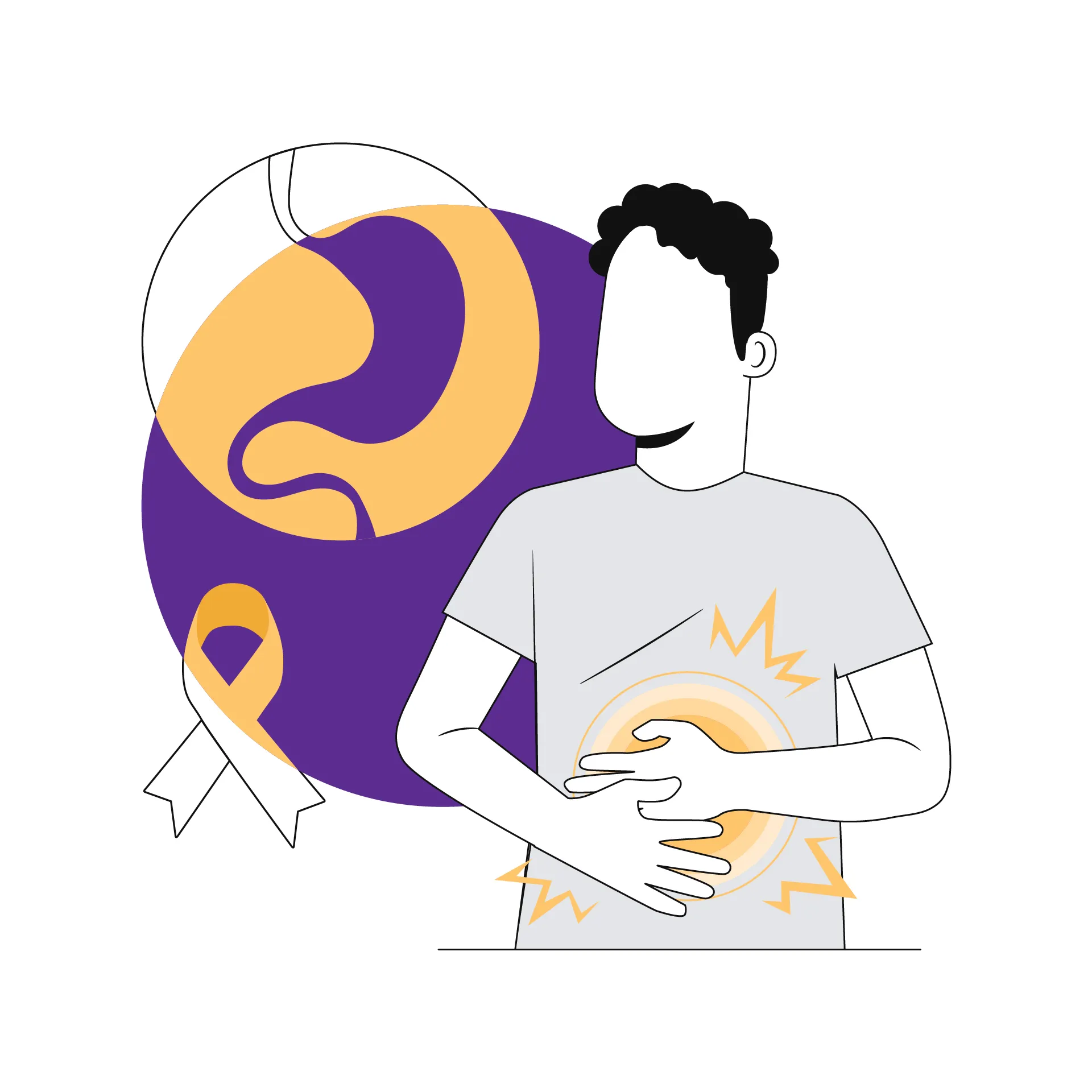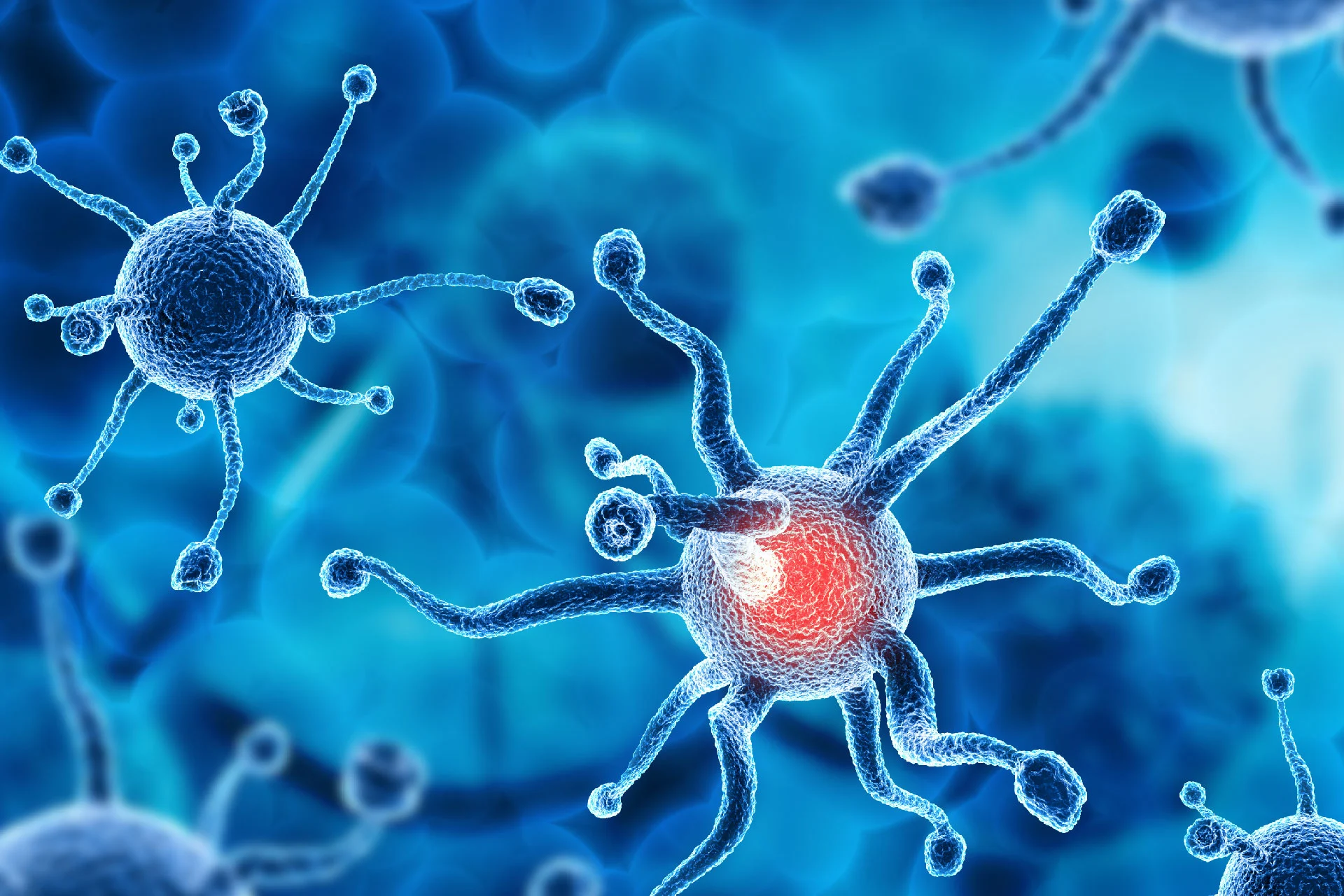Cancer | 7 min read
Stomach Cancer: Causes, Symptoms and Treatment
Medically reviewed by
Table of Content
Synopsis
Cancer can be defined as a state when abnormal cells grow, leading to the destruction of healthy body tissue. In the case of Stomach Cancer, the abnormal growth of cells begins in the inner lining of the stomach. The stomach is said to be a muscular sac located just below the ribs in the upper middle of the abdomen. The stomach holds the foods, breaks the essential nutrients & supplies them to other digestive organs.
Key Takeaways
- Stomach cancer is mostly seen in people of age 60s to 80s
- Stomach Cancer originates in the stomach and then spreads to other parts
- The symptoms of the disease are not often visible in the preliminary stage
As per a source in the patients of the United States, Stomach Cancer is more likely to affect the gastroesophageal junction, also called the esophagus. The cancer cells accumulated in the stomach's inner lining develop into tumors. The tumor in the stomach spreads along the stomach wall or beyond the stomach affecting other organs. However, this process happens slowly.
As per National Cancer Institute research conducted in 2021, there were an estimated 27,000 cases of Stomach Cancer.[1] There are several forms of Stomach Cancer, classified based on the type of tissue they grow in. The types include adenocarcinoma, gastrointestinal stromal tumor (GIST), and neuroendocrine tumor.
A little knowledge may help to treat the disease before it takes worse shape. Read more on Stomach cancer symptoms, causes, and treatment & don't forget to check positive notes.
Symptoms of Stomach Cancer
Stomach cancer symptoms are not typically seen in the early stages. Some of the common symptoms include:
- Trouble in swallowing
- Heartburn
- The tendency to bloat after having food
- Digestion Issue
- Pain In the Stomach
- Nausea
- Vomiting
- Fatigue
- Loss of appetite.
The symptoms are common in other health conditions like an ulcer. Although if the symptoms are frequent, take the doctor's opinion without delay.
Some of the serious symptoms which you should not avoid include:
- Blood in stool
- Weight loss without any reason
- Weakness, vomiting, nausea
- Lump in the stomach area
- Yellowish eyes & skin
- Jaundice
Stomach cancer symptoms in children include:
- Constipation
- Diarrhea
- Weakness
The rest of the symptoms are similar, as discussed.

Causes for Stomach Cancer
The actual Stomach cancer causes are not yet identified. Although doctors say Stomach Cancer begins when the cell's DNA changes. The cell's DNA instructs the cell on what to do. The changes instruct the cell to grow quickly and live even after healthy cells die. The accumulation of these cells leads to the formation of tumors and the destruction of healthy tissue. With time the cell breaks and spreads to the other parts of the body. This condition is said to be metastasized, advanced-stage of Stomach Cancer. However, researchers have identified certain reasons that enhance the risk of this condition.
Risk factors of Stomach Cancer
As already discussed, the actual cause is not yet identified, but researchers have suggested a few things that increase the risk of cancer cell development. Here are a few factors that may cause stomach cancer:
- H. pylori are known as Heliobacter pylori, a type of bacteria responsible for ulcers.
- Stomach polyps, known as gastric polyps, are masses of cells accumulated in the inner lining of the stomach.
- Inherited syndrome like Lynch syndrome, Li-Fraumeni syndrome, and non-polyposis colorectal.
- Certain lifestyle choices also come under risk factor
- Eating salty or processed foods in high amounts.
- Less intake of fruits & vegetables.
- Drinking alcohol regularly
- Overeating of meat
- Smoking
- Not engaging in physical activities
- Unhygienic food
Other factors include:
- Body Weight more than needed
- Stomach Cancer became common after the 60s
- Family History of cancer
- Working in metal and rubber industries.
- Asbestos Exposure
- Epstein-Barr Virus
Stomach Cancer is common among Asians, South Americans & Eastern Europeans. Knowing the risk factor helps to predict the cause.
Additional Read: All About Cancer
How To Confirm this Health Condition
It is hard to diagnose in the initial stage due to a lack of symptoms. Still, if you feel any uneasiness, visit a doctor. The doctor may suggest certain screening tests to be sure. The doctor starts with a physical examination to check visible signs. They may ask a few questions regarding medical history and lifestyle choices to analyze risk factors. To get greater accuracy in Stomach Cancer, they may suggest the following test.
- Blood test to look for anemia & other signs of abnormalities.
- A test to look for bloody stool
- EGD, also known as upper endoscopy, analyzes the inner lining of the upper digestive tract, including the esophagus and stomach. This test is done using a flexible tube attached to tiny light and video camera on the end. It is inserted slowly into your mouth & throat.
- CT scan gives a full X-ray of your body. It detects internal injuries, bleeding, tumors, and problems in other parts of your body.
- The biopsy is a procedure in which a sample of cells is taken from your stomach and examined using a microscope to know the signs of cancer and its development.
Before undergoing this test, confirm with the doctor if there is any restriction to be followed.
Additional Read: What Is Colorectal CancerTreatments for Stomach Cancer
Before knowing about Stomach cancer treatment, let us dig deeper into the stages of cancer.
Stage 0: The cancer cells are present on the surface of the stomach. It hasn't spread to lymph nodes or other parts of the body. Usually, surgery is suggested in this stage. The doctor may remove lymph nodes or other parts of the body's germ-fighting system.
Stage 1: In this stage tumor grows in the stomach's lining. There are chances of spreading cancer into lymph nodes but not to other body parts. The doctor may likely suggest chemotherapy and surgery.
Chemotherapy is a drug treatment used before surgery to kill fast-growing cancer cells.
Stage 2: In this stage tumor reaches to deeper layer & spread in lymph nodes, whereas other parts of the body remain unaffected. Surgery is performed to remove a part or all parts of the stomach as well as lymph nodes. Chemotherapy or Chemo radiation is given before and after the surgery.
In chemoradiation, the cancer cell is destroyed by a beam of energy.
Stage 3: In stage three tumor has extended into a deeper layer & possibly affected nearby organs like the spleen or colon.
You must undergo surgery to remove the entire stomach, along with chemotherapy or chemoradiation.
Stage 4: In the last phase, Stomach Cancer reaches a deeper level and affects distant parts such as the liver, brain, or lungs. Complications are higher in this stage, but relief can be attained to a certain extent with the help of a doctor and treatment.
The treatment plan depends on the factors like origin, stage, age, and response to the treatment. However, the doctors recommend the following treatment considering these factors.
- Medication
- Surgery
- Chemotherapy
- Chemoradiation
- Immunotherapy
Cancer insurance helps cover the cost of medical treatments related to Stomach Cancer. It may pay for expenses such as chemotherapy, radiation, surgery, and hospital stays. It can also cover the cost of transportation to and from treatments and loss of income due to time off work. Cancer insurance plan can provide financial support during a difficult and costly time.
Additional Read: Radiotherapy for CancerTypes of Cancers
Here are a few types of cancer other than Stomach Cancer to be aware of:
- Prostate cancer is a form of cancer that begins in the prostate gland when the cells grow out of control. The research suggests that the pre-cancerous condition is the reason for it. However, it is not yet proven. [2]
- Endometrial cancer- This cancer begins in the uterus. Endometrial cancer cells accumulate in the lining of the uterus. The symptom of cancer includes pain in the pelvic, vaginal bleeding after menopause. It can be detected in the early stages due to irregular vaginal bleeding. Removing the uterus is often recommended for this condition.
The development in the medical industry has increased the survival rate & in the early stages. You can also opt for some healthy practices to lower the risk of Stomach Cancer, like including more fruits & vegetables in your diet, avoiding unhealthy practices of alcohol & smoke, reducing salty food intake, and maintaining a healthy weight through proper exercise.
A proper conversation with doctors is highly required during this time. You can make this process simple by getting the doctor's opinion through video conferencing. Bajaj Finserv Health has taken the initiative to offer the required guidance through a simple click. To get a consultation, you have to sign in to the Bajaj Finserv Health application, provide your details, and you can fix a doctor appointment with one click. Also, be sure to check out the Cancer Secure Plan Cover By Bajaj Finserv.
References
- https://www.cancer.org/research/cancer-facts-statistics/all-cancer-facts-figures/cancer-facts-figures-2021.html
- https://www.sciencedirect.com/topics/medicine-and-dentistry/precancerous-condition
Disclaimer
Please note that this article is solely meant for informational purposes and Bajaj Finserv Health Limited (“BFHL”) does not shoulder any responsibility of the views/advice/information expressed/given by the writer/reviewer/originator. This article should not be considered as a substitute for any medical advice, diagnosis or treatment. Always consult with your trusted physician/qualified healthcare professional to evaluate your medical condition. The above article has been reviewed by a qualified doctor and BFHL is not responsible for any damages for any information or services provided by any third party.



